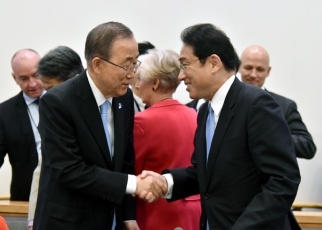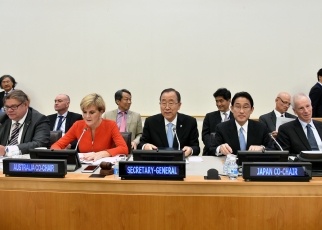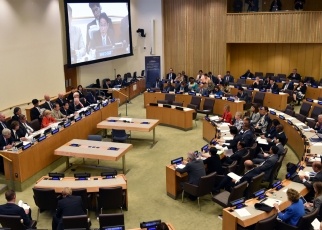Nuclear Disarmament and Non-Proliferation
Eighth Ministerial Meeting of the Friends of the Comprehensive Nuclear Test Ban Treaty (CTBT)
September 21, 2016



H.E. Mr. Fumio Kishida, Minister for Foreign Affairs, and H.E. Ms. Julie Bishop MP, Minister for Foreign Affairs of Australia, co-chaired eighth Ministerial Meeting of the Friends of the CTBT held at the United Nations Headquarters in New York on September 21. The overview of the meeting is as follows.
1 Overview
(1)Approximately 100 countries participated in the eighth Ministerial Meeting of the Friends of the CTBT, including about 30 Foreign Ministers from co-hosting Friends of the CTBT (Japan, Australia, the Netherlands, Germany, Canada and Finland), Kazakhstan as a co-coordinator for facilitating entry into force of the CTBT (note: Japan is also a co-coordinator), and others.
(2)As a Co-chair, Australian Foreign Minister Bishop made the opening remarks and United Nations Secretary-General Ban Ki-moon delivered a statement. They highlighted the urgent need for the ratification of states whose ratification is required for the entry into force of the treaty to move forward with ratification and called for efforts to realize early entry into force of the treaty. Mr. Frank-Walter Steinmeier, Federal Minister for Foreign Affairs of Germany, Mr. St?phane Dion, Minister of Foreign Affairs of Canada, Mr. Bert Koenders, Minister of Foreign Affairs of the Netherlands, and other representatives of Friends Member countries as well as Mr. Yun Byung-se, the Minister of Foreign Affairs of the Republic of Korea, Ms. Retno L. P. Marsudi, Minister for Foreign Affairs of the Republic of Indonesia, and Mr. Lassina Zerbo, Executive Secretary of the Preparatory Commission for the Comprehensive Nuclear-Test-Ban Treaty Organization (CTBTO) delivered statements. Many countries called for early entry into force of the CTBT and stressed the importance of building inspection capabilities. There were also many remarks condemning North Korea's recent nuclear test, and strongly urging it to comply with relevant UN Security Council resolutions and other commitments and not to conduct further nuclear tests. Furthermore, Myanmar and the Kingdom of Swaziland announced their ratifications of the CTBT (which makes number of ratifying states, 166).
(3) Finally, Minister Kishida, as a co-chair, adopted the Ministerial Joint Statement on Promoting Effectuation of the CTBT (PDF) and delivered his closing remarks (PDF)
and delivered his closing remarks (PDF) .
.
(2)As a Co-chair, Australian Foreign Minister Bishop made the opening remarks and United Nations Secretary-General Ban Ki-moon delivered a statement. They highlighted the urgent need for the ratification of states whose ratification is required for the entry into force of the treaty to move forward with ratification and called for efforts to realize early entry into force of the treaty. Mr. Frank-Walter Steinmeier, Federal Minister for Foreign Affairs of Germany, Mr. St?phane Dion, Minister of Foreign Affairs of Canada, Mr. Bert Koenders, Minister of Foreign Affairs of the Netherlands, and other representatives of Friends Member countries as well as Mr. Yun Byung-se, the Minister of Foreign Affairs of the Republic of Korea, Ms. Retno L. P. Marsudi, Minister for Foreign Affairs of the Republic of Indonesia, and Mr. Lassina Zerbo, Executive Secretary of the Preparatory Commission for the Comprehensive Nuclear-Test-Ban Treaty Organization (CTBTO) delivered statements. Many countries called for early entry into force of the CTBT and stressed the importance of building inspection capabilities. There were also many remarks condemning North Korea's recent nuclear test, and strongly urging it to comply with relevant UN Security Council resolutions and other commitments and not to conduct further nuclear tests. Furthermore, Myanmar and the Kingdom of Swaziland announced their ratifications of the CTBT (which makes number of ratifying states, 166).
(3) Finally, Minister Kishida, as a co-chair, adopted the Ministerial Joint Statement on Promoting Effectuation of the CTBT (PDF)
 and delivered his closing remarks (PDF)
and delivered his closing remarks (PDF) .
. 2 Assessment
(1)This meeting took place amid heightened interest in the international community as the 20th anniversary of opening the CTBT for signature and North Korea's recent nuclear tests. It confirmed high-level political commitment from a wide range of countries for early entry into force of the CTBT, including participation by Foreign Ministers from roughly 30 countries, significantly exceeding the previous meeting. Additionally, two new countries announced ratification at this event, and this news boosted momentum for early entry into force of the CTBT.
(2)Many participants criticized North Korea's nuclear tests, and these comments reconfirmed the strong will of the international community that it never accepts North Korea's nuclear tests.
(3)Minister Kishida stated that North Korea's nuclear tests are totally unacceptable and advocated the necessity of early entry into force of the CTBT in order to solidify a legal ban on nuclear tests. Additionally, the adoption of the Joint Ministerial Statement as the co-chair enabled this Ministerial Meeting of the Friends of the CTBT to sent a strong message.
(2)Many participants criticized North Korea's nuclear tests, and these comments reconfirmed the strong will of the international community that it never accepts North Korea's nuclear tests.
(3)Minister Kishida stated that North Korea's nuclear tests are totally unacceptable and advocated the necessity of early entry into force of the CTBT in order to solidify a legal ban on nuclear tests. Additionally, the adoption of the Joint Ministerial Statement as the co-chair enabled this Ministerial Meeting of the Friends of the CTBT to sent a strong message.
(Reference)Foreign Ministers’ Meeting of the Friends of the CTBT
(1)This meeting takes place in the off year for the Conference on Facilitating the Entry into Force of the CTBT (held once every two years; Foreign Minister level) and aims to maintain and strengthen momentum for bringing the CTBT into force. It issues a Ministerial Joint Statement as the meeting outcome. The First Meeting of the Friends of CTBT took place in 2002 with Japan, Australia, and the Netherlands as co-chairs. Seven meetings were held prior to this one.
(2)Friends of the CTBT is a group of nations formed by Japan, Australia, and the Netherlands that coordinates and promotes efforts to facilitate entry into force of the CTBT mainly in Vienna where the Preparatory Commission for the Comprehensive Nuclear-Test-Ban Treaty Organization (CTBTO) is located. The group currently consists of seven countries including the three above-mentioned countries plus Canada, Finland, Germany, and coordinator for entry into force Kazakhstan (co-chair of the Ninth Conference on Facilitating the Entry into Force of the CTBT (Japan is currently a co-chair of the Conference on Facilitating the Entry into Force of the CTBT).
(2)Friends of the CTBT is a group of nations formed by Japan, Australia, and the Netherlands that coordinates and promotes efforts to facilitate entry into force of the CTBT mainly in Vienna where the Preparatory Commission for the Comprehensive Nuclear-Test-Ban Treaty Organization (CTBTO) is located. The group currently consists of seven countries including the three above-mentioned countries plus Canada, Finland, Germany, and coordinator for entry into force Kazakhstan (co-chair of the Ninth Conference on Facilitating the Entry into Force of the CTBT (Japan is currently a co-chair of the Conference on Facilitating the Entry into Force of the CTBT).

